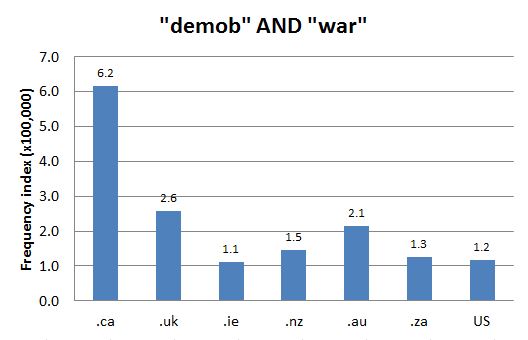DCHP-2
demob de-mob DCHP-2 (October 2016)
1 v. — abbreviation, Military
to demobilize.
Type: 5. Frequency — Demob is an abbreviation of "demobilize" and appears in British English and the Englishes of some of the Commonwealth countries, including Canada (COD-2, s.v. "demob"). According to OED-3 (s.v. "demob"), the term initially gained popularity at the end World War I when troops began being released from service. A past construction of the clipped verb, "demobbed", has become one of the most frequent forms along with the full verb "demobilized" (see the 1919, 1962 and 2014 quotations, for example). Demob appears most frequently in Canada (see Chart 1).
See also COD-2, s.v. "demob", which is marked "Cdn, Brit., & Austral. dated", ITP Nelson, s.v. "demob", which is marked "Chiefly British".- The reader may be surprised that the term is more frequent in Canada than in the UK. The best explanation is the conservative (preservation) strands in Canadian English, which are at times quite extreme, but at other times not present at all (see, e.g. Dollinger 2015).
2 n. — abbreviation, Military
demobilization.
Type: 5. Frequency — Demob can also be an abbreviation of the noun "demobilization" and, as with meaning 1, it came into prominence after World War I. Early citations for the term appear most frequently in logs of enlisted soldiers and it is quite frequently abbreviated with a period (see, for example, the 1951 and 1960 quotations). More recent written evidence seems to show demob most often used in prepositional phrases such as "upon [his] demob" or "after demob" and without the period. Another common use of the term is its attributive role in the phrase "demob suit", which is a set of civilian clothes offered to discharged soldiers returning home (see the 1999 quotation). Internet search results indicate that the term appears most frequently in Canada (see Chart 1).
See also COD-2, s.v. "demob", which is marked "Cdn, Brit., & Austral. dated".References:
Images:
Chart 1: Internet Domain Search, 21 Aug. 2014
